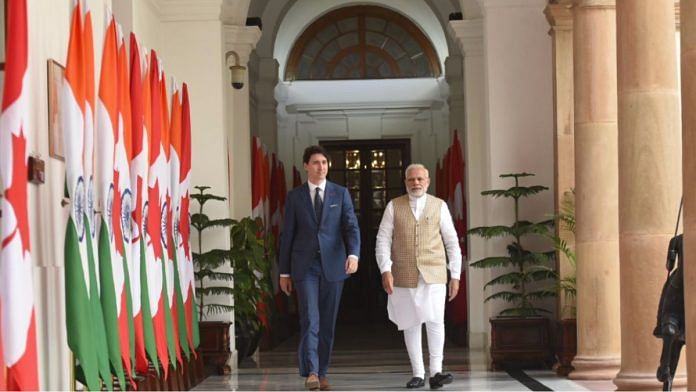


Canadian Prime Minister Justin Trudeau has picked a fight that neither New Delhi nor Ottawa needs. But does Trudeau need it? Perhaps, because in stoking up the India specter in Canada, he sees a way to deflect attention and survive his dwindling popularity within his own party and among the Canadian public. Looking at the turn of events in the past year, Trudeau seems laser-focused on dragging down the India-Canada relationship to a point of no return. Therefore, the political class in Canada needs to rise to the occasion and save the bilateral equation from the Trudeau problem.
High drama unfolded this week, with the Canadian government ballooning up allegations against India by naming the serving Indian High Commissioner and other diplomats as ‘persons of interest’ in an ongoing investigation on the killing of Sikh separatist Hardeep Singh Nijjar. During a press conference, the Royal Canadian Mounted Police (RCMP) further alleged that “links tying agents of the Government of India (GOI) to homicides and violent acts” in Canada was a serious issue. India’s Ministry of External Affairs (MEA) quickly refuted the claims, called them “preposterous imputations” and blamed Trudeau’s “political agenda” based on “vote bank politics”. “The responsibility for the damage that this cavalier behaviour has caused to India-Canada relations lies with Prime Minister Trudeau alone,” MEA said in a statement.
Trudeau’s diabolical venture against India comes at a time when his own political career is seriously flagging with no sight of redemption. Within his Liberal Party, at least 20 dissatisfied MPs signed a pact calling for his removal from the PM’s post. A recent opinion poll also showed Canadians growing in their disapproval of Trudeau’s tenure as PM and as leader of the Liberal Party. Around two-thirds (67 per cent) of Canadians disapprove of Trudeau’s leadership, a figure that has increased by 4 points since June 2024.
Pierre Poilievre, leader of the Conservative Party of Canada, remains the favourite for the PM post among Canadians with 45 per cent approval ratings. He had earlier asked Trudeau to “come clean” with more information related to the allegations against India. During an interview, he commented, “Justin Trudeau is considered a laughing stock in India – the world’s biggest democracy…it’s fine to have our disagreements and to hold each other accountable, but we have to have a professional relationship.” Even former foreign minister Marc Garneau didn’t spare Trudeau and wrote that he was incompetent in foreign affairs and blamed the PM for hurting Canada’s standing in the world.
Also read: Why has India reacted differently to Canada & US? Trudeau did politics, America hard diplomacy
India-Canada ties, otherwise, are going favourably strong in most sectors, particularly the economic and strategic fronts. Bilateral trade stood at more than $8 billion in FY23, and it is projected to grow much further if a bilateral Comprehensive Economic Partnership Agreement (CEPA) were to be achieved. Moreover, Canada’s Indo-Pacific Strategy, which was released in November 2022, recognised that “India’s growing strategic, economic and demographic importance in the Indo-Pacific” made it a “critical partner in Canada’s pursuit of its objectives under this strategy”. “India’s strategic importance and leadership—both across the region and globally—will only increase as India—the world’s biggest democracy—becomes the most populous country in the world and continues to grow its economy,” the strategy contended.
Clearly, Trudeau’s myopia on the strategic goals of the India-Canada relationship is in stark contrast to how New Delhi and Washington are dealing with the case of another Sikh separatist, Gurpatwant Singh Pannun. Both sides, in this case, have responded by according more significance to their strategic partnership and have signalled that allowing the relationship to drift is not an option. Understanding among diplomatic, intelligence, and law enforcement agencies allows elbowroom for handling such sensitive cases. The style that the Trudeau government has adopted in this case shows domestic politics is overriding international engagements, norms of diplomatic ties and strategic considerations.
Since September 2023, India-Canada diplomatic relations have gone for a rapid downward spiral and now hit rock bottom. Though inter-state diplomatic spats and sparring are not off the book in international relations and do happen occasionally even among the best of allies and partners, the way the Trudeau government has handled the case publicly against India without providing any substantial evidence is what makes it particularly damaging.
The ball is now completely in Canada’s court to prevent a serious strategic drift that will be hard to salvage. It is clear that the relationship is in ventilator mode and will need serious thinking and action from the larger political class in Canada. It will need saving from Trudeau’s unwarranted bravado and megaphone diplomacy.
Monish Tourangbam is Director at the Kalinga Institute of Indo-Pacific Studies (KIIPS). Views are personal.
(Edited by Humra Laeeq)



